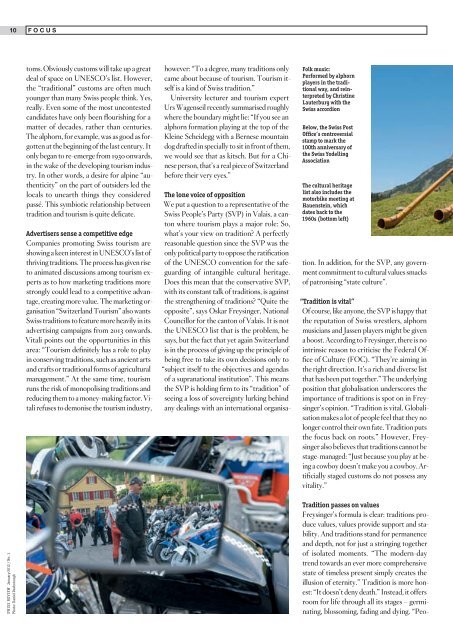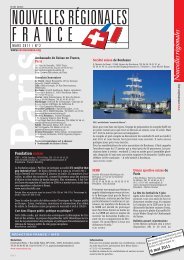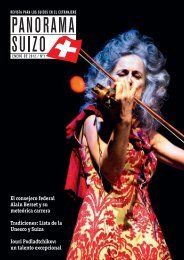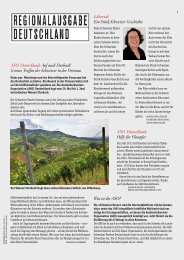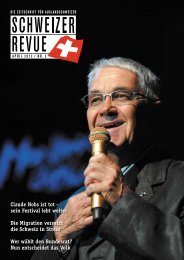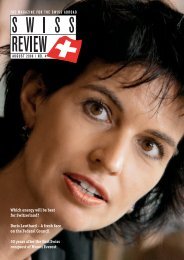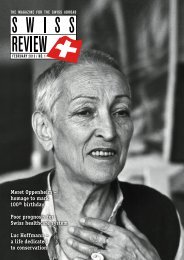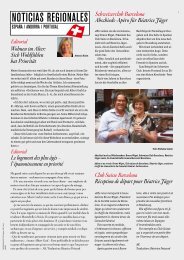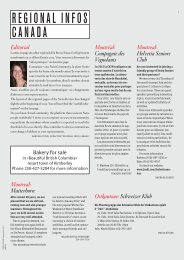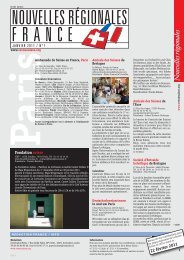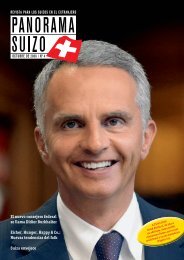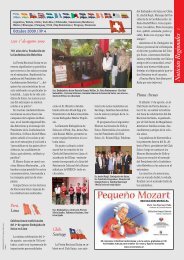Download PDF Swiss Review 1/2012 - Schweizer Revue
Download PDF Swiss Review 1/2012 - Schweizer Revue
Download PDF Swiss Review 1/2012 - Schweizer Revue
You also want an ePaper? Increase the reach of your titles
YUMPU automatically turns print PDFs into web optimized ePapers that Google loves.
10 FOCUS<br />
toms. Obviously customs will take up a great<br />
deal of space on UNESCO’s list. However,<br />
the “traditional” customs are often much<br />
younger than many <strong>Swiss</strong> people think. Yes,<br />
really. Even some of the most uncontested<br />
candidates have only been flourishing for a<br />
matter of decades, rather than centuries.<br />
The alphorn, for example, was as good as forgotten<br />
at the beginning of the last century. It<br />
only began to re-emerge from 1930 onwards,<br />
in the wake of the developing tourism industry.<br />
In other words, a desire for alpine “authenticity”<br />
on the part of outsiders led the<br />
locals to unearth things they considered<br />
passé. This symbiotic relationship between<br />
tradition and tourism is quite delicate.<br />
Advertisers sense a competitive edge<br />
Companies promoting <strong>Swiss</strong> tourism are<br />
showing a keen interest in UNESCO’s list of<br />
thriving traditions. The process has given rise<br />
to animated discussions among tourism experts<br />
as to how marketing traditions more<br />
strongly could lead to a competitive advantage,<br />
creating more value. The marketing organisation<br />
“Switzerland Tourism” also wants<br />
<strong>Swiss</strong> traditions to feature more heavily in its<br />
advertising campaigns from 2013 onwards.<br />
Vitali points out the opportunities in this<br />
area: “Tourism definitely has a role to play<br />
in conserving traditions, such as ancient arts<br />
and crafts or traditional forms of agricultural<br />
management.” At the same time, tourism<br />
runs the risk of monopolising traditions and<br />
reducing them to a money-making factor. Vitali<br />
refuses to demonise the tourism industry,<br />
however: “To a degree, many traditions only<br />
came about because of tourism. Tourism itself<br />
is a kind of <strong>Swiss</strong> tradition.”<br />
University lecturer and tourism expert<br />
Urs Wagenseil recently summarised roughly<br />
where the boundary might lie: “If you see an<br />
alphorn formation playing at the top of the<br />
Kleine Scheidegg with a Bernese mountain<br />
dog drafted in specially to sit in front of them,<br />
we would see that as kitsch. But for a Chinese<br />
person, that’s a real piece of Switzerland<br />
before their very eyes.”<br />
Folk music:<br />
Performed by alphorn<br />
players in the traditional<br />
way, and reinterpreted<br />
by Christine<br />
Lauterburg with the<br />
<strong>Swiss</strong> accordion<br />
Below, the <strong>Swiss</strong> Post<br />
Office’s controversial<br />
stamp to mark the<br />
100th anniversary of<br />
the <strong>Swiss</strong> Yodelling<br />
Association<br />
The cultural heritage<br />
list also includes the<br />
motorbike meeting at<br />
Hauenstein, which<br />
dates back to the<br />
1960s (bottom left)<br />
The lone voice of opposition<br />
We put a question to a representative of the<br />
<strong>Swiss</strong> People’s Party (SVP) in Valais, a canton<br />
where tourism plays a major role: So,<br />
what’s your view on tradition? A perfectly<br />
reasonable question since the SVP was the<br />
only political party to oppose the ratification<br />
of the UNESCO convention for the safeguarding<br />
of intangible cultural heritage.<br />
Does this mean that the conservative SVP,<br />
with its constant talk of traditions, is against<br />
the strengthening of traditions? “Quite the<br />
opposite”, says Oskar Freysinger, National<br />
Councillor for the canton of Valais. It is not<br />
the UNESCO list that is the problem, he<br />
says, but the fact that yet again Switzerland<br />
is in the process of giving up the principle of<br />
being free to take its own decisions only to<br />
“subject itself to the objectives and agendas<br />
of a supranational institution”. This means<br />
the SVP is holding firm to its “tradition” of<br />
seeing a loss of sovereignty lurking behind<br />
any dealings with an international organisation.<br />
In addition, for the SVP, any government<br />
commitment to cultural values smacks<br />
of patronising “state culture”.<br />
“Tradition is vital”<br />
Of course, like anyone, the SVP is happy that<br />
the reputation of <strong>Swiss</strong> wrestlers, alphorn<br />
musicians and Jassen players might be given<br />
a boost. According to Freysinger, there is no<br />
intrinsic reason to criticise the Federal Office<br />
of Culture (FOC). “They’re aiming in<br />
the right direction. It’s a rich and diverse list<br />
that has been put together.” The underlying<br />
position that globalisation underscores the<br />
importance of traditions is spot on in Freysinger’s<br />
opinion. “Tradition is vital. Globalisation<br />
makes a lot of people feel that they no<br />
longer control their own fate. Tradition puts<br />
the focus back on roots.” However, Freysinger<br />
also believes that traditions cannot be<br />
stage-managed: “Just because you play at being<br />
a cowboy doesn’t make you a cowboy. Artificially<br />
staged customs do not possess any<br />
vitality.”<br />
swiss <strong>Review</strong> January <strong>2012</strong> / No. 1<br />
Photo: Daniel Desborough<br />
Tradition passes on values<br />
Freysinger’s formula is clear: traditions produce<br />
values, values provide support and stability.<br />
And traditions stand for permanence<br />
and depth, not for just a stringing together<br />
of isolated moments. “The modern-day<br />
trend towards an ever more comprehensive<br />
state of timeless present simply creates the<br />
illusion of eternity.” Tradition is more honest:<br />
“It doesn’t deny death.” Instead, it offers<br />
room for life through all its stages – germinating,<br />
blossoming, fading and dying. “Peo-


